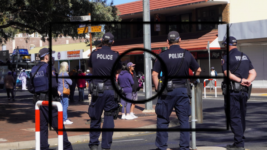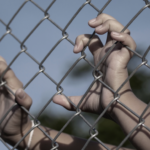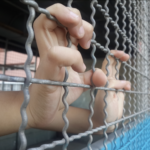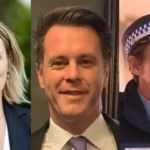Northern Territory Curfew Laws Target First Nations Youth

A quick perusal of the new laws permitting the NT police commissioner to impose snap curfews as a crime prevention measure finds them colourblind, in that the policing powers recently gifted to the Northern Territory Police Force can be applied to all and sundry regardless of ethnic background.
But the open secret about these laws, which streamline the ability to impose curfews, is they target First Nations youth.
Indeed, as the bill was introduced last month, it was the “success” of the recent three-week-long youth curfew in the centre of Mparntwe-Alice Springs that was cited to justify them.
The curfew in Mparntwe saw all youth under the age of 18 prohibited from entering the city centre between 6 pm and 6 am, which was called after a number of incidents occurred involving Aboriginal young people, including an accident involving a stolen car and a riot outside a local pub.
NT chief minister Eva Lawler told the press on announcing the coming laws that it was about NT authorities being able to impose such measures “across the length and breadth of the Territory”, while police minister Brent Potter explained that officers loved the last curfew and wanted more.
But the dead giveaway regarding these laws targeting First Nations youth is that built into the legislation is a clause that ensures that when a curfew is imposed, or any other measure within it is exercised by officers, Northern Territory antidiscrimination laws automatically don’t apply.
A divisive law
The explanatory note relating to the Police Administration Legislation Amendment Bill 2024 outlines that it provides the commissioner with “powers to declare public disorder situations”, as well as giving police officers “special powers to control the movement of persons within declared areas”.
The bill makes no mention of curfews, however. Instead, it inserted section 135B into the Police Administration Act 1978 (NT) (the Act), which allows the commissioner to declare a public disorder incident is underway, which can be a “riot or other civil disturbance that gives rise to a serious risk”.
A declaration must be made in writing and include the nature of the public disorder, the declared area it applies to and its time frame, which cannot exceed 72 hours. And as well, it must state whether it applies to all or a particular class of person, which may involve a specific attribute.
Such notice also results in particular powers that apply, which include ordering a person to leave a declared area or not to enter it, being able to order a group that has gathered in the area to disperse or an officer can order a person to remain in a declared area for up to 2 hours for their safety.
If a power is exercised, the officer must explain to the individual involved whether it was imposed to curb crime or for their safety. And if the subject being ordered to act in a particular way by police refuses to follow orders, then officers can use reasonable force to ensure they comply.
The legislation also makes refusal to follow an order an offence, which carries a maximum penalty of a $1,408 fine.
And if the NT police commissioner considers that a 72 hour public order declaration with its related powers is not long enough for the issue it’s been applied to quell, the top cop can then apply to the police minister for an extension of time, which can last for up to another seven days.
Suspending protections to discriminate
New section 135C(3) of the Act states that “the Anti-Discrimination Act 1992 does not apply to a public disorder declaration or any actions taken by the commissioner or a member under a declaration in accordance with this division”.
So, this automatic suspension of NT antidiscrimination law in order to lock down a particular group or community is obviously empowering the NT police commissioner to apply such orders to First Nations youths or communities, without having to worry about the act being labelled as racist.
And suspending laws designed to protect against discriminatory behaviour has long been part and parcel of lawmaking in settler colonial Australia.
The Queensland government suspended its Human Rights Act 2019 (Qld) twice last year to facilitate tough-on-youth-crime laws. The first time was so a youth breach of bail offence could be enacted, and the second instance involved a law permitting kids to be locked up in adult watchhouses.
And it’s not just First Nations youth that Australian governments are willing to suspend legislated protective laws over, as the Racial Discrimination Act 1975 (Cth) (RDA) has been put on hold three times in order to facilitate discriminatory policies affecting Aboriginal people regardless of age.
The Howard government passed the Hindmarsh Island Bridge Act 1997 (Cth), which suspended the RDA to allow for the construction of a bridge on the sacred grounds of the Ngarrindjeri people in South Australia.
While the Native Title Amendment Act 1998 (Cth) prevents the RDA from applying to specific sections of the Native Title Act 1993 (Cth), so that when native title is extinguished in favour of pastoral leases, Indigenous people aren’t entitled to compensation for loss of land.
And the Northern Territory National Emergency Response Act 2007 (Cth) saw the RDA suspended outright in order to allow for highly racist and discriminatory measures to be implemented right across the Top End under the framework of the NT Intervention.
The usual lack of consultation
“The NT Labor government passed new curfew laws to give police unprecedented power to lock down communities,” Blak Sovereign Movement Senator Lidia Thorpe wrote on X on the same day that the NT passed it discriminatory laws.
“These laws will be used against First Peoples and will see more of our kids dragged into the criminal legal system, exacerbating underlying issues and driving recidivism,” the Gunnai, Gunditjmara and Djab Wurrung politician added.
And attacks on First Nations youth who fall foul of the law are all the rage in Australian parliaments right now, with this state having seen NSW premier Chris Minns launch a bail crackdown on Indigenous youth, which was an issue that appeared to drop out of the sky requiring his attention.
North Australian Aboriginal Justice Agency (NAAJA) principal legal officer Jared Sharp told NITV as the Lawler ministry was rolling out its racist lockdown laws, that the government had neglected to consult legal experts, oversight bodies or both the children’s and antidiscrimination commissioners.
“We are extremely concerned that it will be Aboriginal people, who are going to be right in the middle of this disastrous curfew,” Sharp warned.
“From our perspective, Aboriginal community-controlled organisations need to be resourced to actually deal with the underlying causes of offending and improve community safety,” the lawyer made certain in conclusion.







